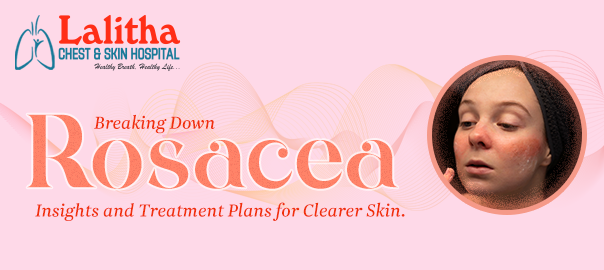Rosacea is a chronic inflammatory disorder that mainly affects the central areas of the face, including the cheeks, nose, forehead, and chin. It typically starts with an increased tendency to blush or flush, but this redness can develop into a more persistent and noticeable condition over time.
“In more severe cases, rosacea can lead to the development of small, red, pus-filled bumps, and in rare cases, it can cause the nose to become swollen and bumpy, a condition known as rhinophyma,” says the best skin specialist in Karimnagar Dr. B. Jyothi at Lalitha Chest & Skin Hospital.
So, with insights from dermatologist Dr. B. Jyothi, this blog will help you understand Rosacea, including its causes, symptoms, and treatment options, to help you manage the condition for more precise, healthier skin.
Types of Rosacea:
There are four main subtypes of Rosacea, each with its own set of symptoms:
- Erythematotelangiectatic Rosacea (ETR): This subtype is characterized by persistent redness, flushing, and visible blood vessels.
- Papulopustular Rosacea: Often mistaken for acne, this type involves redness, swelling, and acne-like breakouts.
- Phymatous Rosacea: This rarer subtype is associated with skin thickening and an enlarged, bumpy nose.
- Ocular Rosacea: This type affects the eyes, causing them to appear red, irritated, and watery. It can also lead to swollen eyelids and other eye-related issues.
What causes Rosacea?
The exact cause of Rosacea remains unknown, but several factors are believed to contribute to its development:
- Genetics: Family history can play a significant role, suggesting a genetic predisposition to the condition.
- Immune System: Some research suggests that the immune system may overreact to specific triggers, leading to the inflammation seen in Rosacea.
- Environmental Triggers: Sun exposure, hot weather, stress, spicy foods, alcohol, and certain skincare products can all exacerbate rosacea symptoms.
- Microorganisms: Demodex mites on the skin or Helicobacter pylori bacteria in the gut have been linked to Rosacea in some individuals.
What are the Symptoms of Rosacea?
Symptoms of Rosacea can vary widely among individuals, but common signs include:
- Persistent facial redness
- Visible blood vessels (telangiectasia)
- Swollen red bumps that may resemble acne
- Skin thickening, particularly around the nose
- Eye irritation and redness
- Burning or stinging sensations on the skin
Treatment Plans for Rosacea:
While there is no cure for Rosacea, several treatment options can help manage symptoms and improve the skin’s appearance. The treatment plan typically depends on the subtype and severity of the condition.
- Topical Medications: These are often the first line of treatment. Metronidazole, azelaic acid, and ivermectin creams are commonly prescribed to reduce red skin rosacea and inflammation.
- Oral Medications: Antibiotics like doxycycline can be effective for moderate to severe Rosacea, mainly when bumps and pimples are present. In some cases, isotretinoin, a powerful acne medication, may be prescribed.
- Laser and Light Therapy: These treatments target visible blood vessels and redness, helping to reduce their appearance. They are handy for ETR and phymatous Rosacea.
- Lifestyle Modifications: Identifying and avoiding triggers in managing Rosacea is crucial. This might involve using gentle skincare products, wearing sunscreen daily, and avoiding known triggers such as spicy foods or alcohol.
- Skincare Routine: A consistent skincare routine that includes gentle cleansing, moisturizing, and sun protection can help maintain skin health and minimize flare-ups.
- Psychological Support: Rosacea can have a significant impact on mental health. Seeking support from a therapist or joining a support group can be beneficial for those struggling with the emotional effects of the condition.
Living with Rosacea can be challenging, but with the right treatment plan and lifestyle adjustments, symptoms can be managed effectively, and clearer skin can be achieved.
If you suspect you have Rosacea, it’s essential to consult a dermatologist who can provide a tailored treatment plan based on your specific needs. Early intervention is critical to preventing the condition from worsening and improving your overall quality of life.
When finding the proper treatment for your skin, consulting a specialized dermatologist is your best bet. If you are suffering from skin conditions like Rosacea and have been searching for “rosacea bumps treatment,” “rosacea pimples treatment,” or “face cleanser for redness” on Google, we can save you the hassle!
Dr. B. Jyothi is Karimnagar’s premier dermatologist, offering advanced skin treatments to enhance skin health. For inquiries, contact us at Lalitha Chest & Skin Hospital.


